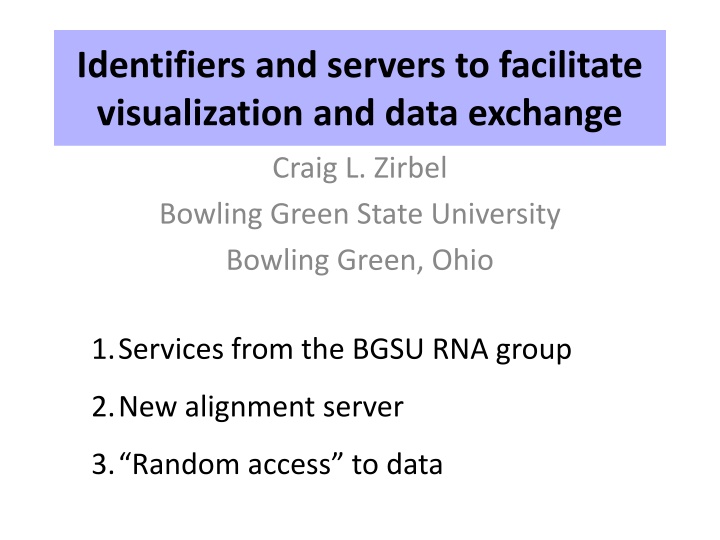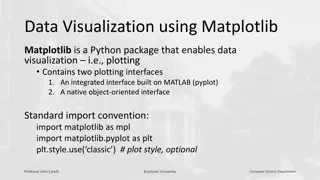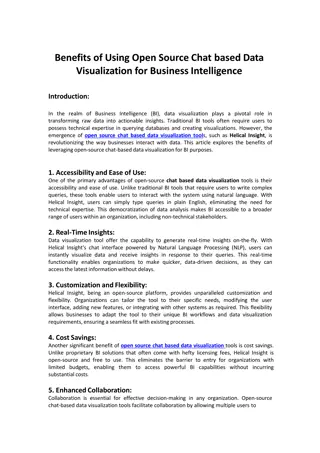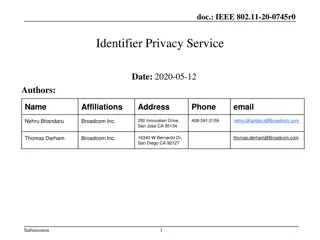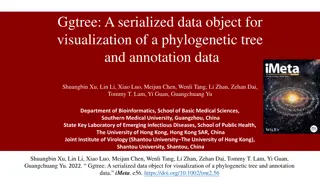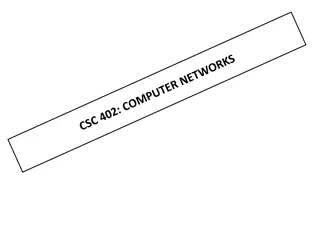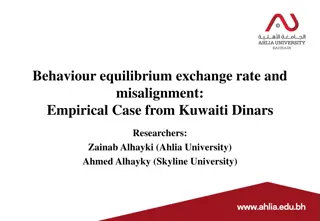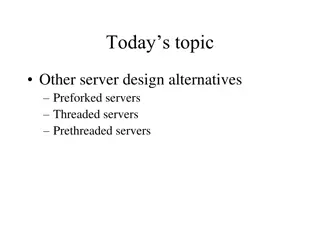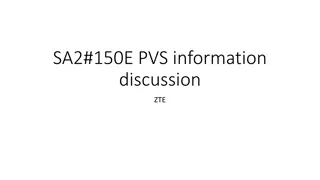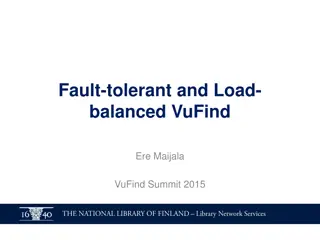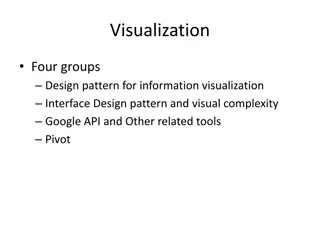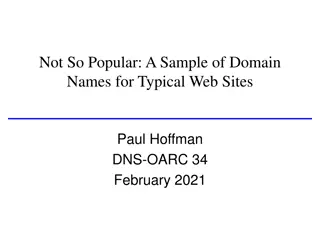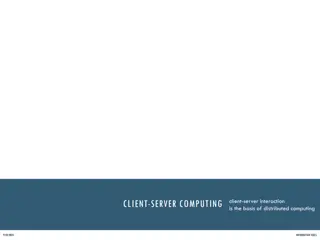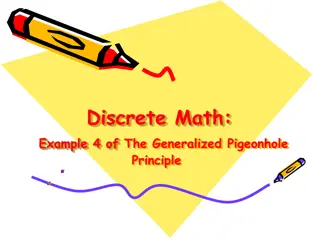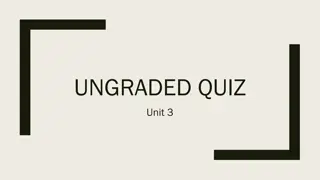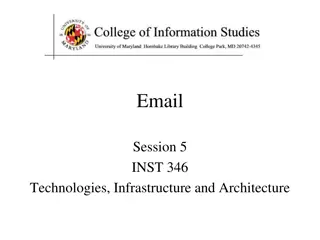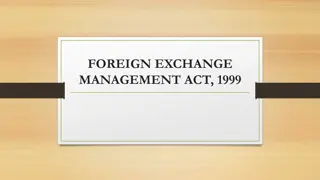Identifiers and Servers for Data Visualization and Exchange
Craig L. Zirbel at Bowling Green State University offers services through the BGSU RNA group for analyzing and annotating RNA 3D structures. They focus on Watson-Crick and non-Watson-Crick base pairs, base stacking, interactions, and motif searches. The group's ultimate goal is to predict 3D motifs from sequences. They have established an annotation pipeline for retrieving and annotating new structures weekly. Additionally, there are ongoing improvements to non-redundant lists. The annotations cover pairwise interactions, basepairs, and unit identification in 3D structure files.
Download Presentation

Please find below an Image/Link to download the presentation.
The content on the website is provided AS IS for your information and personal use only. It may not be sold, licensed, or shared on other websites without obtaining consent from the author.If you encounter any issues during the download, it is possible that the publisher has removed the file from their server.
You are allowed to download the files provided on this website for personal or commercial use, subject to the condition that they are used lawfully. All files are the property of their respective owners.
The content on the website is provided AS IS for your information and personal use only. It may not be sold, licensed, or shared on other websites without obtaining consent from the author.
E N D
Presentation Transcript
Identifiers and servers to facilitate visualization and data exchange Craig L. Zirbel Bowling Green State University Bowling Green, Ohio 1.Services from the BGSU RNA group 2.New alignment server 3. Random access to data
BGSU RNA Group rna.bgsu.edu Neocles Leontis, Chemistry Craig Zirbel, Mathematics and Statistics Students from Biology, Chemistry, Computer Science, Statistics We analyze and annotate RNA 3D structures Watson-Crick and non-Watson-Crick basepairs Base stacking, base-backbone interactions Equivalence classes and non-redundant lists 3D motif search (FR3D) and the 3D Motif Atlas Ultimate goal: predict 3D motifs from sequence Wednesday talk (JAR3D)
Annotation pipeline Retrieves and annotates new structures each week On holiday since December 2014 while we re-tool to read and analyze mmCIF files Moving to a new server, nearly done Improvements to non-redundant lists coming soon
Annotations of pairwise interactions Basepairs in 3D structure file 4A1B Tetrahymena LSU
Annotations of pairwise interactions 3D structure file 4A1B - Tetrahymena cSH interaction between G47 and U48 Basepair list for an internal loop JSMol window for selected basepair
Annotations of pairwise interactions 3D structure file 4A1B - Tetrahymena cSH interaction between G47 and U48 Basepair list for an internal loop Neighborhood of selected basepair
Unit ID is a unique string 3D structure file 4A1B - Tetrahymena cSH interaction between G47 and U48 4A1B|1|1|G|47 Basepair list for an internal loop Neighborhood of selected basepair
Annotations of pairwise interactions Basepairs in 3D structure file 4A1B Tetrahymena Download all annotations from all structures at: http://rna.bgsu.edu/rna3dhub/data/interactions.csv.gz
RNA Basepair Catalog at NDB UG is by far the most common base combination in the cHS family
Equivalence classes and NR lists Identify 3D structures of the same molecule from the same organism; equivalent 4A1B is the representative of this equivalence class
Equivalence classes and NR lists Choosing one representative from each equivalence class gives a non-redundant list 89 weekly releases from February 2012 to December 2014 Improvements and new releases coming soon!
RNA 3D Motif Atlas Extract internal loops and hairpin loops and arrange them into motif groups 19 releases, every four weeks, between March 2013 and December 2014 Improvements and new releases coming soon!
RNA 3D Motif Atlas Tetra Pig Top view
Homologous location, different eukaryotes Yeast Kluyveromyces Plasmodium A49 is bulged out A in yeast and K.l. U in Plasmodium
A little science Across eukaryotes, what base occurs at this position most often? Are different bases at this position frozen evolutionary accidents, or do they change more freely? Look at the column of a multiple sequence alignment that corresponds to this nucleotide. The R3D-2-MSA alignment server retrieves columns of an alignment corresponding to given nucleotide IDs.
Identifiers and servers to facilitate visualization and data exchange Craig L. Zirbel Bowling Green State University Bowling Green, Ohio 1.Services from the BGSU RNA group 2.New alignment server 3. Random access to data
rna.bgsu.edu/r3d-2-msa alignment server Select a 3D structure by its PDB ID
rna.bgsu.edu/r3d-2-msa alignment server Select chain and/or alignment Select nucleotide range or ranges
rna.bgsu.edu/r3d-2-msa alignment server Summary of the corresponding column of the alignment from Robin Gutell s group A occurs most often; G occurs least often!
rna.bgsu.edu/r3d-2-msa alignment server Look only at Fungi A, G, and U all occur in Fungi. Similar variety occurs in other phylogenetic groups.
Identifiers and servers to facilitate visualization and data exchange Craig L. Zirbel Bowling Green State University Bowling Green, Ohio 1.Services from the BGSU RNA group 2.New alignment server 3. Random access to data
Implementation of visualizations Visualizations are done by JSMol and PV (Protein Viewer) We do not store PDB fragments for each possible view 3D coordinates are retrieved from the coordinate server hosted at rna.bgsu.edu
Coordinate server URL access Coordinates of requested nucleotides or amino acid residues are stored in Model 1. Coordinates of nearby nucleotides, amino acids, ions, etc. are stored in Model 2. Anton Petrov s jmolTools makes it easy to insert visualizations into web pages using the coordinate server.
Alignment server URL access Get alignment server results by specifying the right URL. For example, sequences of the longer strand of the Sarcin-Ricin internal loop can be retrieved from the URL: http://rna.bgsu.edu/r3d-2-msa?units=3U5H|1|5||45:3U5H|1|5||53
Alignment server programmatic access Python input response = fetch("http://rna.bgsu.edu/r3d-2-msa", params={'units': '3U5H|1|5||49'}, headers=headers) data = response.json() Output in JSON format {'status': 'succeeded', 'full': [{'AccessionID': 'D17810', 'TaxID': 3072, 'SeqVersion': 1, 'SeqID': 15, 'ScientificName': 'Pseudochlorella pringsheimii', 'LineageName': 'root \\ cellular organisms \\ Eukaryota \\ Viridiplantae \\ Chlorophyta \\ Trebouxiophyceae \\ Chlorellales \\ Chlorellaceae \\ Pseudochlorella \\ Pseudochlorella pringsheimii \\ ', 'CompleteFragment': 'A'}, {'AccessionID': 'U34340', 'TaxID': 7907, 'SeqVersion': 1, 'SeqID': 3590, 'ScientificName': 'Acipenser brevirostrum', 'LineageName': 'root \\ cellular organisms \\ Eukaryota \\ Opisthokonta \\ Metazoa \\ Eumetazoa \\ Bilateria \\ Deuterostomia \\ Chordata \\ Craniata \\ Vertebrata \\ Gnathostomata \\ Teleostomi \\ Euteleostomi \\ Actinopterygii \\ Actinopteri \\ Chondrostei \\ Acipenseriformes \\ Acipenseroidei \\ Acipenseridae \\ Acipenserinae \\ Acipenserini \\ Acipenser \\ Acipenser brevirostrum \\ ', 'CompleteFragment': '-'},
Random access to data Full PDB/CIF file Retrieve 3D coordinates for given Unit IDs via the coordinate server Full multiple sequence alignment Retrieve columns of an alignment for given nucleotide Unit IDs via the R3D-2-MSA server Retrieve columns of an alignment for given sequence positions in a secondary-structure diagram
Planned services Annotations: Retrieve a partial list of annotations of pairwise interactions for given nucleotide IDs 3D to 3D alignments: Retrieve a list of nucleotides in 3D structure B corresponding to a list of nucleotide IDs in 3D structure A First for 3D structures of the same molecule from the same organism Later for 3D structures from different organisms
Possible services Random access to Rfam, Silva, GreenGenes, and other RNA multiple sequence alignments Random access to protein alignments Random access to electron density near given nucleotides and/or amino acids Your suggestions?
Acknowledgments Anton Petrov Unit IDs, Coordinate server, jmolTools Blake Sweeney R3D-2-MSA alignment server Conversion to mmCIF, retooling our pipeline Looking for a postdoc in the next year Jamie Cannone (Robin Gutell s group) Database queries to retrieve alignment slices Adding 3D sequences to sequence alignments Robin Gutell, University of Texas at Austin Neocles Leontis, BGSU
